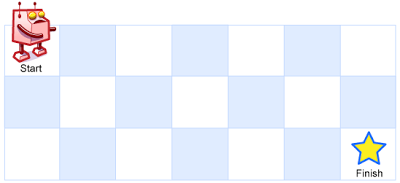leetcode Daily Challenge on June 29, 2020.
leetcode-cn Daily Challenge on December 9th, 2020.
A robot is located at the top-left corner of a m x n grid (marked 'Start' in the diagram below).
The robot can only move either down or right at any point in time. The robot is trying to reach the bottom-right corner of the grid (marked 'Finish' in the diagram below).
How many possible unique paths are there?
Above is a 7 x 3 grid. How many possible unique paths are there?
Input: m = 3, n = 2 Output: 3 Explanation: From the top-left corner, there are a total of 3 ways to reach the bottom-right corner: 1. Right -> Right -> Down 2. Right -> Down -> Right 3. Down -> Right -> RightInput: m = 7, n = 3 Output: 28
1 <= m, n <= 100- It's guaranteed that the answer will be less than or equal to
2 * 10 ^ 9.
- mine
- Java
-
Recursion
Time Limit Exceeded😥// O(2^S)time O(M)space // S is Math.min(m,n) public int uniquePaths(int m, int n) { return path(1, 1, m, n); } public int path(int sx, int sy, int ex,int ey){ if(sx == ex || sy == ey){ return 1; } return path(sx, sy + 1, ex, ey) + path(sx + 1, sy, ex, ey); } -
Dynamic Programming
Runtime: 0 ms, faster than 100.00%, Memory Usage: 36.4 MB, less than 32.05% of Java online submissions// O(T)time O(T)space // T = m * n public int uniquePaths(int m, int n) { //f(i,j) = f(i-1,j) + f(i , j - 1); int[][] res = new int[m][n]; for(int i = 0; i < m; i++){ Arrays.fill(res[i], 1); } for(int i = 1; i < m; i++){ for(int j = 1; j < n; j++){ res[i][j] = res[i - 1][j] + res[i][j-1]; } } return res[m - 1][n - 1]; }
-
- Java
- the most votes
-
Math
Runtime: 0 ms, faster than 100.00%,Memory Usage: 33 MB, less than 5.10% of Java online submissions//O(m)time O(1)space public int uniquePaths(int m, int n) { int N = n + m - 2;// how much steps we need to do int k = m - 1; // number of steps that need to go down double res = 1; // here we calculate the total possible path number // Combination(N, k) = n! / (k!(n - k)!) // reduce the numerator and denominator and get // C = ( (n - k + 1) * (n - k + 2) * ... * n ) / k! for (int i = 1; i <= k; i++) res = res * (N - k + i) / i; return (int)res; }
-
